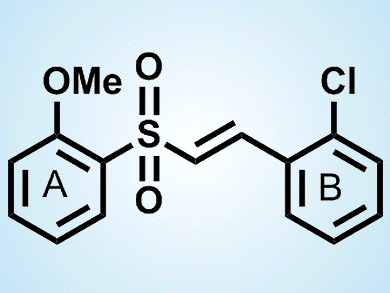Parkinson’s is a neurodegenerative disease caused by the loss of dopaminergic neurons, namely nervous cells producing the neurotransmitter dopamine. The death of these cells is, at least partially, due to the excessive synthesis of reactive oxygen species. A promising strategy to counteract this process consists of activating Nrf2 (nuclear factor E2-related factor 2), a protein that stimulates the expression of antioxidant enzymes.
Ki Duk Park, Korea Institute of Science and Technology (KAIST), Seoul, and co-workers synthesized 56 vinyl sulfone derivatives of chalcone, a α,β-unsaturated ketone. Among them, a derivative with a OMe group on ring A and an electron-withdrawing group (2”-Cl) on ring B (pictured) most potently activated Nrf2. As a consequence, this chemical induced the Nrf2-dependent expression of antioxidant enzymes and, thus, attenuated the death of dopaminergic neurons. By doing so, this compound attenuated the motor deficits, which are characteristic of Parkinson’s disease.
This compound may, thus, be a promising drug for the treatment of Parkinson’s.
- Discovery of Vinyl Sulfones as a Novel Class of Neuroprotective Agents toward Parkinson’s Disease Therapy,
Seo Yeon Woo, Ji Hyun Kim, Mi Kyeong Moon, Se-Hee Han, Seul Ki Yeon, Ji Won Choi, Bo Ko Jang, Hyo Jung Song, Yong Gu Kang, Jin Woo Kim, Jaeick Lee, Dong Jin Kim, Onyou Hwang, Ki Duk Park,
J. Med. Chem. 2014.
DOI: 10.1021/jm401788m




